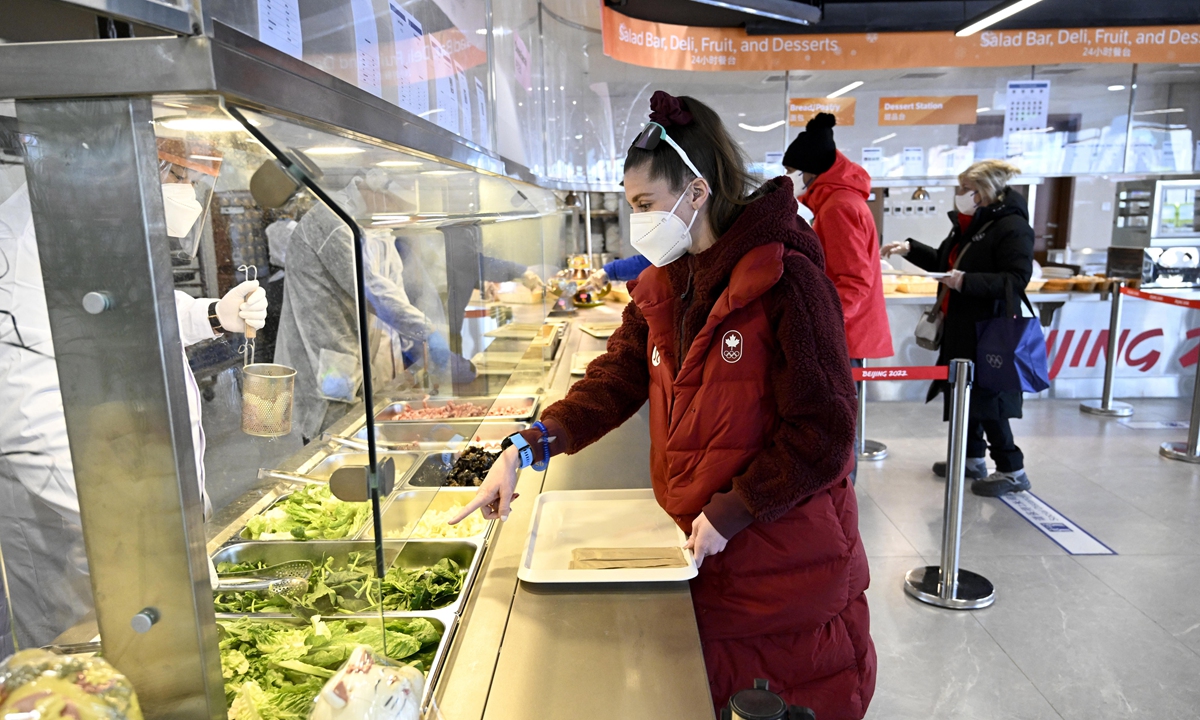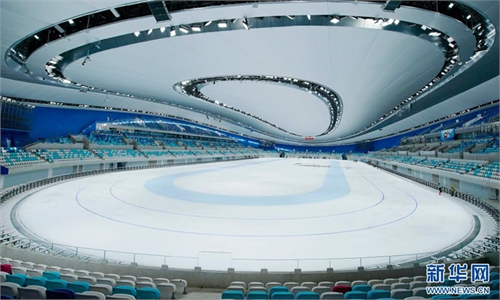Beijing Winter Games a banquet of delicacies for athletes
Beef, lamb, roast duck, dumplings top list of favorite foods

An athlete orders food at a restaurant at the Olympic Village on February 1, 2022, in Beijing. Photo: VCG
The ongoing Winter Olympics are not only a sports feast, but also a banquet of delicacies, as the host country is well known across the world for its delicious food. So far, the foods that have won the most kudos in the three Olympic Villages are dishes involving beef, lamb, roast duck, and of course, dumplings.
It is not only the athletes' performances that are trending on social media, but also their enthusiasm and love of Chinese food. Videos of China's 18-year-old freestyle skier Gu Ailing Eileen, who won a gold medal on Tuesday, eating a steamed bun went viral, as well as Gu's previous videos of her gobbling dumplings.
Chinese netizens were also amazed by the craze for steamed buns by Jenise Spiteri, the first-ever snowboarder to represent the European island of Malta. She told media after competition that she eats six steamed buns per day, and she even popped one in her mouth when she got to the base of Genting Snow Park and waited for her score.
US athlete Julia Marino caught Chinese fans by surprise after she admitted to wolfing down around 200 dumplings throughout the Winter Olympics so far. "I've probably had like 200 dumplings since I've been here. I get back from the mountain - dumplings. It's the only thing I feel like is consistently always good," she said in an interview with NBC Chicago on Sunday.
In an interview with the Global Times, Nevin Galmarini, a Swiss snowboarder who stays in the Zhangjiakou Olympic Village, said it is like a "big food court."
"We can have everything. There is European food, Chinese food. There is here even a KFC."
Even Thomas Bach, the president of the International Olympic Committee, said that he ate many dumplings and grew fatter when he showed up at the Main Media Centre of the Winter Olympics on Wednesday. He also said that he prefers spicier food.
Yang Chen, a chef of athletes' restaurant at the Yanqing Olympic Village, said that the menu in the village rotates every eight days, and 30 percent of the dishes are Chinese, while 70 percent are Western. A total of 168 cooks work three shifts to run the restaurant 24 hours a day, the Beijing Daily reported on Thursday.
The most popular dishes in the athletes' restaurant, said Yang, involve lamb, beef, roast duck and dumplings. He particularly mentioned that some foreign athletes have no idea of how to eat Chinese food, so restaurant staff will offer help.
"We also hope to promote Chinese food culture via this opportunity," said Yang.

Yet food has been used by some Western media to harp on the event. They quoted some athletes as saying that the food is cold and inadequate, and that the restaurants even don't provide enough calories that athletes would need.
Reuters quoted Germany's Alpine skiing coach Christian Schwaiger as saying on Monday that "there are no hot meals. There are crisps, some nuts and chocolate and nothing else. This shows a lack of focus on high-performance sport."
Gao Xuemei, the manager of the Yanqing Olympic Village, told the Beijing Daily that they will provide food at the competition venue every time there's a match. Those foods have high calories - for example, they provide chocolate, energy bars and some carbohydrates, such as pasta.
Yang explained that the cooks heat the food every two hours, whether it has been touched or not. All the hot dishes are kept above 65 C, so that athletes can have hot food at any time.
He also said that the restaurant has been carefully matching food, making sure carbohydrates, protein, beans and vitamins are all on the menu.
Lithuanian alpine skier Andrej Drukarov told the Global Times on Wednesday that "the food is actually pretty good, like I had no problems with it. We have a huge choice of food that we can eat."
Swiss snowboarder Nicolas Huber, who tested positive upon arrival in Beijing at the end of January and left quarantine few days ago, said the food in the Olympic Village is amazing and he has nothing to complain about.
"I don't know why people are complaining. It's a different country, what do you expect? I think some people are just spoiled," he said.
Some South Korean athletes voiced discontent about the food in the village, complaining the food is too greasy. Then the Japanese media fired back. Japanese media outlet AERA published an article on Tuesday saying that when South Korean athletes complained about the food, Japanese athletes found it delicious and they had no complaints.
Many Japanese netizens also criticized the handful of South Korean athletes. One widely liked comment on social media said that if Japanese participants are discontented with the food, they will be tolerant; if they can't be, they will chose to negotiate with the Japanese delegation, which then talks to the organizer.
"We won't be like some athletes, just gushing and throwing mud…once one chooses to participate, it is important to have courtesy."
Chinese netizens were also amazed by the craze for steamed buns by Jenise Spiteri, the first-ever snowboarder to represent the European island of Malta. She told media after competition that she eats six steamed buns per day, and she even popped one in her mouth when she got to the base of Genting Snow Park and waited for her score.
US athlete Julia Marino caught Chinese fans by surprise after she admitted to wolfing down around 200 dumplings throughout the Winter Olympics so far. "I've probably had like 200 dumplings since I've been here. I get back from the mountain - dumplings. It's the only thing I feel like is consistently always good," she said in an interview with NBC Chicago on Sunday.
In an interview with the Global Times, Nevin Galmarini, a Swiss snowboarder who stays in the Zhangjiakou Olympic Village, said it is like a "big food court."
"We can have everything. There is European food, Chinese food. There is here even a KFC."
Even Thomas Bach, the president of the International Olympic Committee, said that he ate many dumplings and grew fatter when he showed up at the Main Media Centre of the Winter Olympics on Wednesday. He also said that he prefers spicier food.
Yang Chen, a chef of athletes' restaurant at the Yanqing Olympic Village, said that the menu in the village rotates every eight days, and 30 percent of the dishes are Chinese, while 70 percent are Western. A total of 168 cooks work three shifts to run the restaurant 24 hours a day, the Beijing Daily reported on Thursday.
The most popular dishes in the athletes' restaurant, said Yang, involve lamb, beef, roast duck and dumplings. He particularly mentioned that some foreign athletes have no idea of how to eat Chinese food, so restaurant staff will offer help.
"We also hope to promote Chinese food culture via this opportunity," said Yang.

Jenise Spiteri, the first-ever snowboarder to represent the European island of Malta, pops one in her mouth when she gets to the base of Genting Snow Park and waits for her score on February 9, 2022. Photo: A screenshot from Web
Yet food has been used by some Western media to harp on the event. They quoted some athletes as saying that the food is cold and inadequate, and that the restaurants even don't provide enough calories that athletes would need.
Reuters quoted Germany's Alpine skiing coach Christian Schwaiger as saying on Monday that "there are no hot meals. There are crisps, some nuts and chocolate and nothing else. This shows a lack of focus on high-performance sport."
Gao Xuemei, the manager of the Yanqing Olympic Village, told the Beijing Daily that they will provide food at the competition venue every time there's a match. Those foods have high calories - for example, they provide chocolate, energy bars and some carbohydrates, such as pasta.
Yang explained that the cooks heat the food every two hours, whether it has been touched or not. All the hot dishes are kept above 65 C, so that athletes can have hot food at any time.
He also said that the restaurant has been carefully matching food, making sure carbohydrates, protein, beans and vitamins are all on the menu.
Lithuanian alpine skier Andrej Drukarov told the Global Times on Wednesday that "the food is actually pretty good, like I had no problems with it. We have a huge choice of food that we can eat."
Swiss snowboarder Nicolas Huber, who tested positive upon arrival in Beijing at the end of January and left quarantine few days ago, said the food in the Olympic Village is amazing and he has nothing to complain about.
"I don't know why people are complaining. It's a different country, what do you expect? I think some people are just spoiled," he said.
Some South Korean athletes voiced discontent about the food in the village, complaining the food is too greasy. Then the Japanese media fired back. Japanese media outlet AERA published an article on Tuesday saying that when South Korean athletes complained about the food, Japanese athletes found it delicious and they had no complaints.
Many Japanese netizens also criticized the handful of South Korean athletes. One widely liked comment on social media said that if Japanese participants are discontented with the food, they will be tolerant; if they can't be, they will chose to negotiate with the Japanese delegation, which then talks to the organizer.
"We won't be like some athletes, just gushing and throwing mud…once one chooses to participate, it is important to have courtesy."



